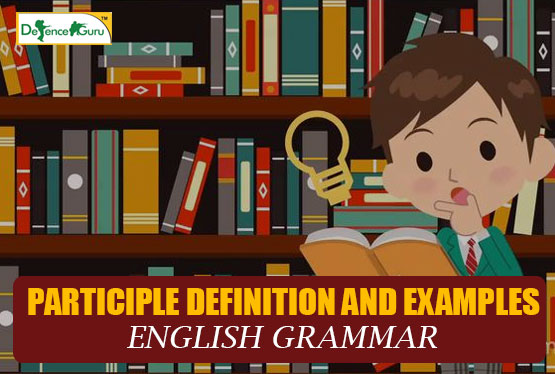Participles
These are the special usage of basic forms of the verb. These are the basic forms of the verbs.
|
V1: (First form of verb) |
To show habits in present, to show routine related activities, for general discussions and also for showing universal facts. |
|
V2: (Second form of verb) |
Used to show indefinite sentences in past |
|
V3: (Third form of verb) |
Used in Perfect Sentences (The sentences in which work is done.) |
|
V ing: (ing form of verb) |
Used in continuous sentences (The sentences in which work is going on) |
Except the above mentioned verb’s forms, there are some special usage too which are made of these basic forms of the verbs only. Participles are of three types.
|
Present Participle |
Used to show quick actions. |
|
Past Participle |
V3 is used as an adjective |
|
Perfect Participle |
Shows perfection of a task |
Present Participle
It shows quick actions. There are two actions in a sentence and there is no time lag between these two actions.
Syntax:
1st Sentence: it begins with “ing” form of verb and 2nd sentence is formed as per time and category of the sentence.
Example:
Seeing a lion, he ran away.
Meeting you, I felt glad.
Hearing this news, he started jumped off with happiness.
Learning this topic, I became confident.
Note:
The above given sentences show that there is no time pass between these actions. The second action took place just after the first one. Here it is to be noted that the second sentence may vary as per time and category of the sentence. If we speak second sentence at first, it will make the sentence meaningless. For example,
I saw many dead soldiers riding across the battle field.
Riding across the battle field, I saw many dead soldiers.
More examples:
- Being in your contact, I got a great work experience.
- Promoting these career options, I found various eminent personalities.
- Taking a cup of tea, I got freshness.
- Getting such challenging responsibilities, I love to prove my skills on them.
- Finding such difficulties in the project, he became diffident.
- Solving these exercises made me more confident in grammar.
- Sharing my queries with my mentors, I got useful solutions to the problem.
- Involving myself into such touch tasks, I got useful information for my career.
- Getting failed in various attempts made him a confident competitor.
- Performing well in the competition, he got recommendation for further assignments.
Past Participle:
Third form of the verb becomes the adjective.
for example missed calls, received calls, dialed calls.
Here we can observe that miss, receive and dial are the verbs but their third form is used as an adjective. It does not happen with all the forms of the verbs, in fact it is with transitive verbs only.
The verbs which require an object to complete its sense are called transitive verbs whereas the verbs which do not require any object in sentence formation is called intransitive verb. Like we can’t say come people, gone people.
- He wears washed clothes.
- Please try to recover these deleted files.
- They had got a repaired watch at a low price.
- These damaged objects were sent for repairs.
- Always wear polished shoes as it makes you a confident personality.
- The delivered goods were not as per my requirement.
- Amit welcomed all the invited guests in the party.
- The rejected candidates were called for a training program.
- The selected candidates completed their tenure of course successfully.
- The dialed number does not exist, please check the number and dial again.
Perfect Participle
In such sentences, it is clearly mentioned that the task has been completed. Perfect sentences have completed actions. These sentences can be made in three ways.
Examples
- Having attended the class, I went to home.
- After attending class, I went to home.
- I went to home after I had attended classes.
The above mentioned three of the sentences show the perfection of the work. We may prefer any one of them.
More Examples:
- Having taken dinner, I sat for study.
- Having discussed these points with him, he derived some conclusions.
- Having analyzed these cases, he made proper strategy to come with more logical points.
- Having been in various challenging profiles, he learnt a lot.
- Having informed my colleagues, I departed for head office.
- Having systems repaired, I did a thorough checking of systems.
- Having learnt these topics, I appeared in exams.
- Having made my assignments ready, I showed them to examiner.
- Having focused on the important areas, I started getting their positive results.
- Having delivered various lectures on grammar, Aditya starting writing important notes for students.






















